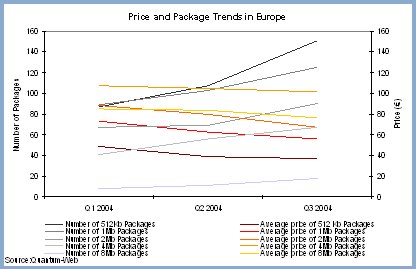The UK House of Commons launched an inquiry into Ofcom’s Strategic Review of Telecommunications (SRT) yesterday.
Ofcom, the uber-regulator that among other things, oversees telecoms in the UK, started its SRT in January 2004. It was long overdue in the eyes of many, as it was the first comprehensive strategic review of the UK telecommunications sector for 13 years.
Now the UK House of Commons, Trade and Industry Committee will be looking into the workings and results of the SRT, in particular how it relates to the “extensiveness and competitiveness” of broadband in the UK.
The SRT is divided in to three phases; Current position and prospects for the telecommunications sector; Options for Ofcom’s strategic approach to telecommunications regulation; and Proposals; the first phase was published at the end of April.
Ofcom identified two key problems in Phase One; an unstable market structure in fixed telecoms, dominated by BT and with alternative providers that are, in the main, fragmented and of limited scale; BT’s control of the UK-wide access network hadn’t been addressed to date. They then posed some questions; primarily about the future of BT.
Phase Two was published in November 04 and used some relatively strong language (pretty diplomatic in the normal, non-Quango world), which we summarised as “Ofcom to BT: Equivalence or else”. It’s still open for public consultation until 3 February 2005.
Yesterdays announcement from the Trade and Industry Committee, said in the light of the Committee’s Report on the UK Broadband Market, the inquiry will be looking into OfCom’s STR process to date, the interim conclusions reached in the Phase Two document, and the direction of the remainder of the Review. They’ll be paying particular attention how it relates to the competitiveness of the broadband market in the UK, including local loop unbundling, and the “functional separation of British Telecom”.
A spokeperson at OfCom told us that they “had already briefed the Committee” and “welcomed their interest” in the SRT. When we asked about the previously expected Spring delivery of SRT Phase 3, we were told that they “still planned” to meet it. Frankly they were playing their cards pretty close to their chest.
We called the office of the Committee, but given the 21 enquiries they have on currently, no one was available for comment at the time of publishing the story.
If you have any view on the area covered by the Committee, they’re asking for written evidence on these or any other related issues by Friday 18 February 2005 via email ([email protected]). If you do write please CC ([email protected]) us in, we’d be interested in see the issues raised.
Alerted by OfcomWatch
Trade and Industry Select Committee
Ofcom – Strategic Review of Telecommunications
